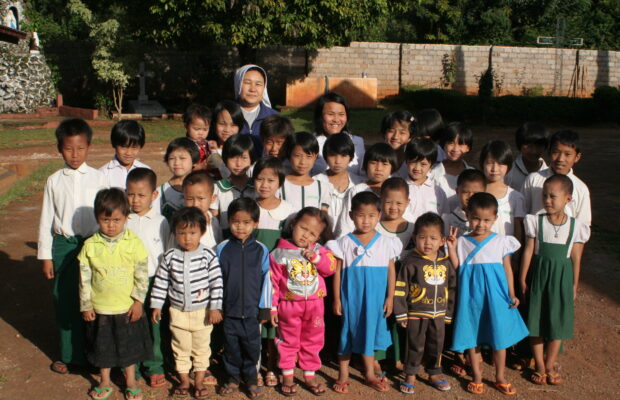
Opium in Kayah State

Kao is a farmer in a mountain village in Kayah State in northeastern Myanmar, in the center of the golden triangle. The inside of his wooden house is bustling with activity. Kao’s youngest grandchildren are playing to come and observe the stranger who’s visiting. They approach for a sneak peek at first, then their laughing faces come closer. Who’ll be the bravest? Their grandfather smiles too, enjoying his grandchildren’s giggles and games; he’s more reserved, though. Only his eyes convey his amusement.
Manna from heaven
The questions I ask him certainly amuse him as they’re unusual coming from fellow citizen. It’s obviously better to cultivate poppies rather than anything else. Above all it’s an easy crop to grow and harvesting only takes 3 months from seed. This is easy to understand considering the hardships of agricultural work in countries where everything is done by hand and cattle are used to pull machinery. Farmers also grow potatoes, beans, and, needless to say, rice. Yet it’s true that when it comes to the poppy, everything is much simpler. An acre of land yields a kilo and a half of the precious sap. The harvest brings in about 700,000 kyatts that will end up, after processing, as high-quality opium. It’s a kind of manna for small-scale farmers used to barely making a living by consuming what they grow. It allows them to buy clothes and rice for the whole family – which in Kao’s case is 17 people.
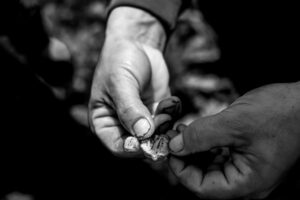
A question of survival
There’s certainly no sign of any kind of wealth inside Kao’s house.The whole family appears to live in genuine poverty. The large upstairs room where we’re gathered functions as the bedroom. It’s completely empty. A few diplomas and photos decorate the walls. A cupboard serves as storage space. Downstairs, on the clay floor, nothing is superfluous. Kao’s wife cooks food in an open fireplace in the dust outside the house. It’s thanks to opium that Kao and his sons are able to make a decent living for themselves and their children. No more than that. “We could have three harvests a year if we wanted to, explains Kao, as he tells me exactly how they grow their crops. But that would need a lot of water. We prefer to have just one harvest and make the most of the rainy season”. The head of the household seems to want to justify himself: Their goal is not to get rich. It’s to survive.
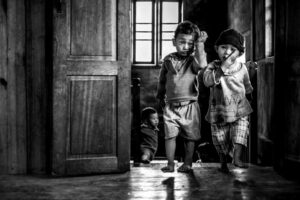

On the mountainside
A few kilometers from the village, Kao takes me along a path to his fields. Growing poppies is of course forbidden by the authorities, so the crops are hidden away. Local farmers use the uneven terrain of the mountainsides to hide their crops from the road. We cross a rice paddy in the middle of which stands a white cross that contrasts with the green rice fields. Italian missionaries evangelized many villagers in the area, and it’s common to see farmers have their crops blessed by a priest. A few meters lower down, a grotto carved out of the rock, similar to the one in Lourdes, dominates the plantations. At the end of the paddy field, the mountain appears to fold in on itself. Out of sight, among the rocks, on a steep hill, grow thousands of poppies. Kao’s son, Ban pulls up a few of them. “They’re growing too close together” he explains. But the plants are never thrown away. Every part of it is edible. “Poppy leaves make a delicious salad” he says with a smile. The opium pods give thousands of seeds and the harvested sap to be transformed.
A natural fertiliser
In the middle of a field where a few flowers have blossomed, either white or purple depending on what kind they are, some spaces reveal bare earth. “This year we had late and very heavy rainfalls ; that’s not good for poppies. Lots of seeds haven’t germinated” explains Kao, although he doesn’t seem too anxious. The most important thing for him is that he has enough poppies to harvest in a month and a half when the pods will be large enough. This isn’t the case for everyone. One of his neighbours explains to me that this year he won’t be able to count on the money he usually makes from his poppies. Rain has washed away all his seeds in his two fields. And crops are being planted higher and higher up. The majestic mountain scenery and hidden valleys reveal crop rotations of poppies, potatoes, and rice fields. “Growing poppies fertilises the land really well” explains Kao, picking cucumbers growing among the delicate flowers. “They’re good for all our others crops”.
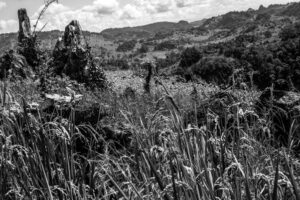
Bad Luck
Once in a while, the police arrive, discovers a field, and destroys it. That’s one of the risks of the trade. But that’s as far as it goes. Everyone’s aware of the situation and knows what’s going on. Even the Pekhon region’s MP, Francisco Kho, has to agree: ‘As long as there’s no plan to develop any kind of infrastructure for isolated mountain communities, nothing will change. We do not allow mountain farmers to basically earn a living by growing legal crops. Roads linking this region to towns are pretty much non-existent, and the plots of land are too small to be intensively farmed. On top of that, the price of raw materials fluctuates too much to allow them to earn a living”. The church shares the same view. The Bishop of Pekhon, Peter Hla, explains, “The church condemns growing poppies on principle, but we face a dilemma. Opium is not necessarily the worst possible solution. “Kao has no wealth himself, only that which comes from man. Communities who have their bare necessities taken away from them fall into far more serious situations. People resort to theft, extorsion, and even murder when they are forced to survive”. In their opinion, Kao and his family have no choice. When the subject of drug trafficking is brought up, Kao blames destiny and thus eludes the question:” We’re very sorry to hear what our crop is being used for but we don’t have any other way to make so much money. It’s bad luck” he concedes, his eyes to the ground.
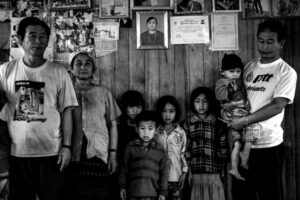
The unknown buyer
At the end of the production chain, there’s the buyer, whose identity remains a mystery. According to Kao, large numbers of both Burmese and foreigners come to the mountainous region to buy the small farmers’ harvests. They go door to door as a salesperson would, only they are there to buy, not to sell. Kao never sells to the same buyer more than once and just a kilo and a half at a time. He only does this when he needs money, and has a bag hidden away ready for when a buyer comes by. Kao explains “When someone has opium to sell, a buyer comes to the door. Selling other crops like rice or potatoes means that we have to make the journey to town, which isn’t easy from where we live”. Kao is seated cross-legged and drinks a glassful of a mixture of water and fermented rice paste. It’s a nourishing, cloudy-looking liquid that keeps the whole family’s bellies full. His expression had become hard as he described the living condition in the village, but he regains his cheerfulness. His features soften and I can see the creases in his face. His eyes retreat into their sockets. It’s late morning and Kao calls out the rest of the family gathered there. “Let’s take a family photo” he says to me, smiling, visibly proud of his clan. Its youngest members join the patriarch and his wife in front of the photos, posters, and school certificates displayed on the wall. Kao has no riches, he’s not a warlord. His only wealth comes from man, in the form of his family who surrounds him. He puffs his chest out and puts his arm around his eldest grandson on his right. They are Kao’s first and foremost priority, and he defies anyone to judge what he does for their survival.
Did you like this article? Perhaps you don’t agree with it? Write to us! info@childrenofthemekong.org
SPONSOR A CHILD IN MYANMAR

